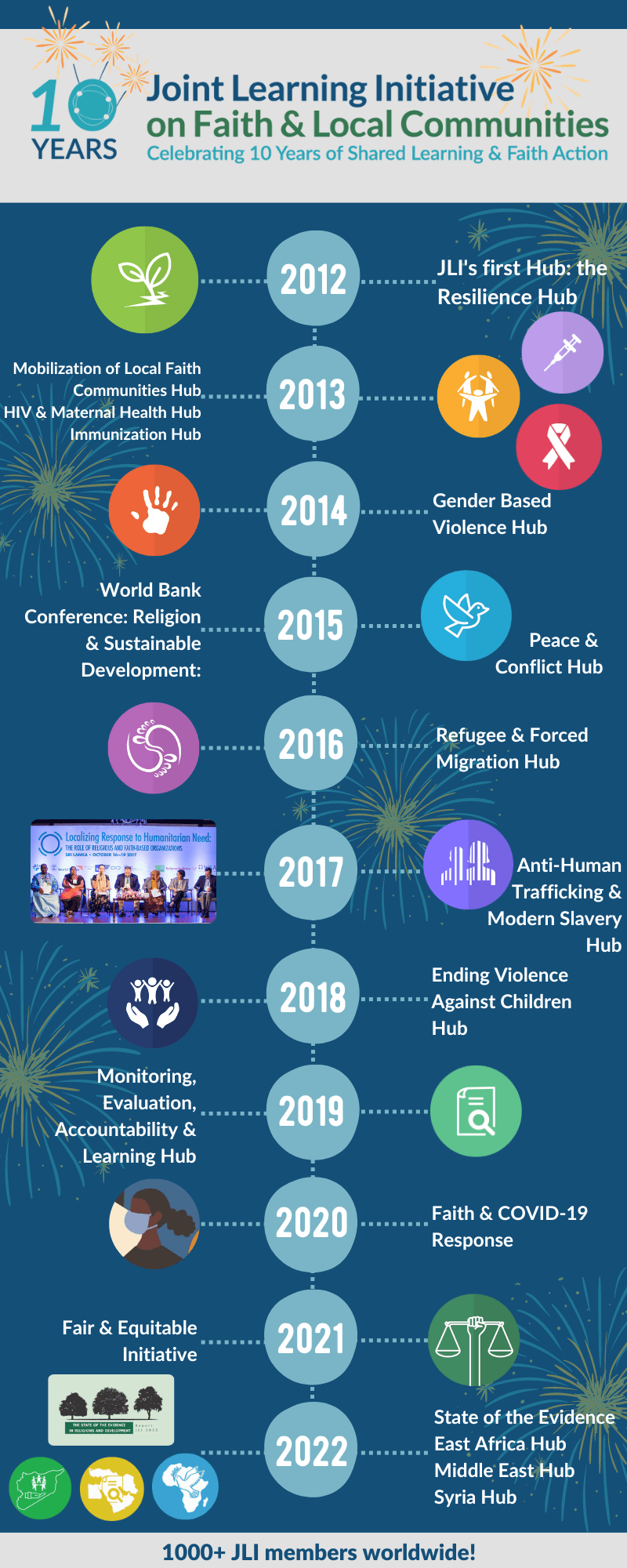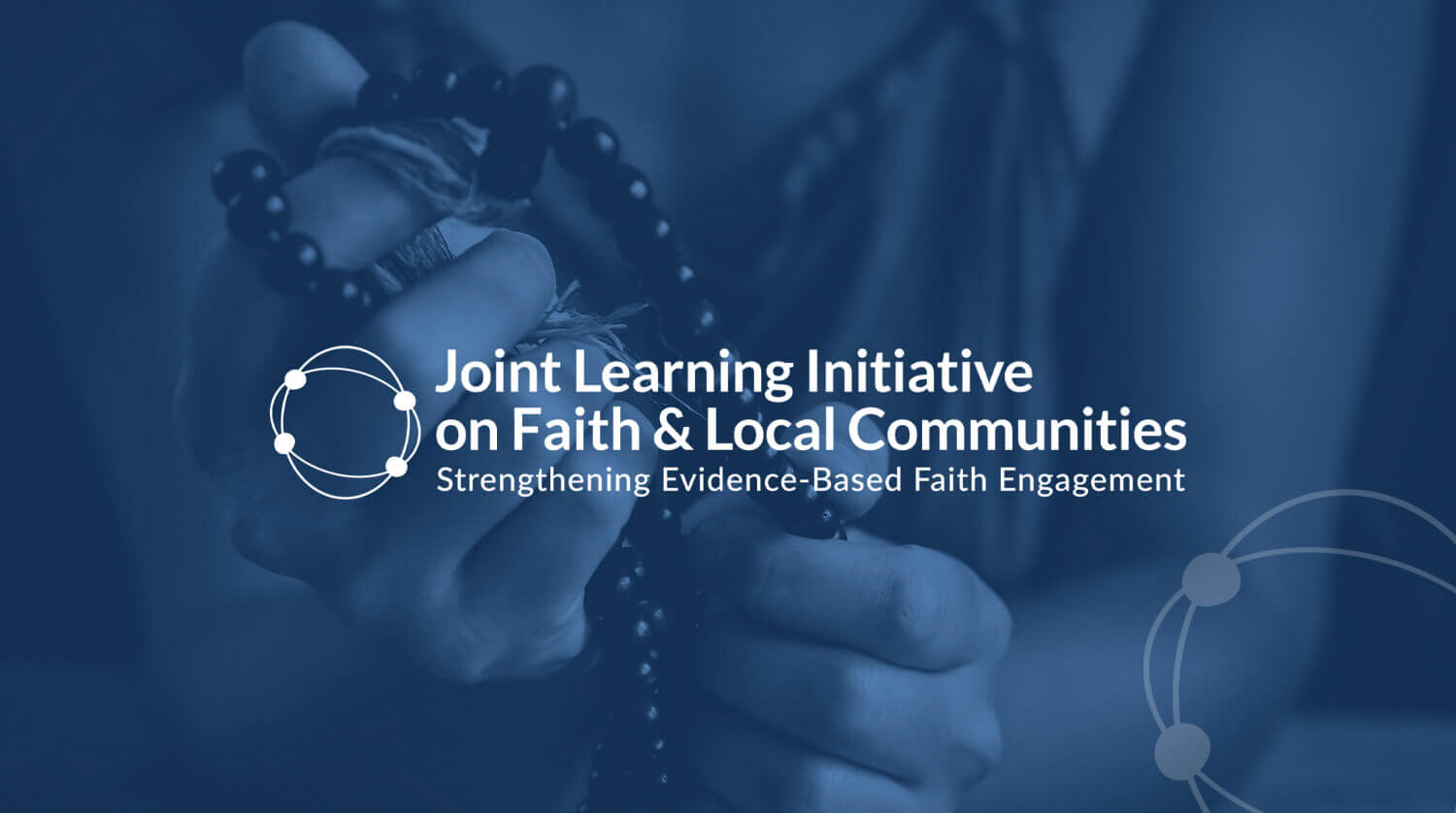This December, JLI is celebrating our 10th Anniversary!

This is a huge milestone for us! What started as a bare-bones initiative with a niche focus is now a thriving, globally-respected, locally-rooted movement – with over 1000 members and a whole body of new evidence under its belt.
To celebrate, we want to take you on a journey through JLI’s history – and share with you some of our key highlights, milestones and successes along the way.
Scroll through our simple visual timeline here, or find the full story below!
2012-2014
In 2012, a group of likeminded people working in religions & development noticed something: a scarcity of evidence on the roles of local faith actors in humanitarian, development and peacebuilding work.
Coordinated by Jean Duff, they decided to do something about it. The group assembled in London and committed to creating a new, unique space where local faith actors, researchers, and policymakers could engage in joint learning together and create research to address the evidence gaps.
It started with the Resilience Hub led by Reverend Rachel Carnegie, Helen Stawski, and Alastair Ager which looked at the impact of local faith actors in promoting resilience in disaster situations.
Over the next year, JLI launched three more Global Learning Hubs:
- The Mobilization of Local Faith Communities Hub, led Catriona de Jean, Andrea Kaufmann, and Christo Greyling, which created a Theory of Change on engaging local faith actors in humanitarian work
- The Immunization Hub, led by Jill Olivier, which examined local faith communities work in immunization and community health systems strengthening
- The HIV & Maternal Health Hub, led by Azza Karam, Christo Greyling, Julie Clague, and Sally Smith, which especially examined prevention of mother-to-child transmission of AIDS and the role of skilled birth attendants
By 2014, JLI’s new Hubs had published four Scoping Studies which mapped and analyzed existing evidence on their respective issues. Scoping Studies were a key contribution to the religions and development discourse, bringing evidence into one space but also exposing evidence gaps. In just two years, we were already contributing to the evidence base on religions and development!
In 2014 we also launched the Gender Based Violence Hub (now co-led by the SVRI).
2015
In 2015 we co-hosted the first-of-its-kind “Religion & Sustainable Development” conference, in partnership with the World Bank, GIZ, USAID, the GHR Foundation, DFID, and World Vision. It convened 130 policymakers, donors, researchers, religious leaders & humanitarian & development practitioners to connect policymakers with the evidence base and expertise to pursue more effective partnerships with faith actors.
In 2015 we also co-led (with the UN Interagency Taskforce on Religion and Development, World Bank, ACT Alliance, and more) the Faith-Based Action Framework on achieving the SDGs. This was presented to the UN General Assembly prior to the launch of the SDGs.
But that’s not all we did in 2015! We also launched the Peace & Conflict Learning Hub, led by Sarah Pickwick, Lucy V Moore, Alp Ozerdem, and Chris Shannahan. The Hub examined faith-based approaches to peacebuilding, conflict prevention, and conflict resolution.
2016
In 2016, JLI hosted a side event at the World Humanitarian Summit, where we presented Evidence Briefs on faith actors in conflict response, upholding human rights, addressing gender-based violence, and more.
In 2016 we also launched the JLI Refugee & Forced Migration Hub, led by Elena Fiddian-Qasmiyeh, Sadia Kidwai, and Atallah FitzGibbon, in response to the global refugee crisis. The Hub convened at the UN Refugee Summit, and would go on to create policy briefs for the Global Compact on Refugees.
One key role JLI has played over the years has been communicating the experiences of local faith actors in international fora – like the World Humanitarian Summit or the UN Refugee Summit in 2016 – spaces where both local and faith voices are often overlooked.
2017
In 2017 we built on this by co-hosting a forum in Sri Lanka on Localizing Response to Humanitarian Need. We convened over 140 participants from local, global, faith and non-faith backgrounds to strengthen partnerships in localizing humanitarian response.
In 2017 we also launched the Anti-HumanTrafficking & Modern Slavery (AHT-MS) Learning Hub, led by Emma Tomalin, Anne Gregora, and Christa Crawford. The Hub went on to produce the ‘Faith & Freedom’ scoping study, examining the role of local faith actors in AHT-MS.
2018-2019
In 2018 we joined with UNICEF and Religions for Peace to create an exciting new initiative: Faith & Positive Change for Children, Families & Communities (or FPCC for short). The project aims to move beyond single-sector ad-hoc approaches & instead support local faith actors across multiple sectors to empower and protect children. The project supports faith-centered research and training of regional facilitators in Mind-Heart Dialogue approaches.
As part of our shift to child protection and child empowerment, in 2018 JLI also launched the Ending Violence Against Children Hub. The Hub went on to launch a three-part scoping study – featuring Literature Reviews, Case Studies & Expert Interviews – in 2019.
In 2019 we launched the Monitoring, Evaluation, Accountability, and Learning (MEAL) Hub, led by Dan Williams, Jennifer Eggert, and Islamic Relief USA. The Hub produced a Compendium of Good Practice on Conducting MEAL in International to Local Faith Actor Partnerships.
In 2019 the JLI Refugee & Forced Migration Hub conducted roundtables with local and national faith actors in Amman and Beirut to discuss their role in implementing the Global Compact on Refugees, and how distanced their work felt from international refugee response systems.
2020
2020 was a year of pause & change for JLI, as it was worldwide. Our founding coordinator Jean Duff stepped down after eight years of service, and we welcomed Kirsten Laursen Muth as our new CEO.
As we struggled with the pandemic & shifting capabilities, our focus for 2020 was clear. We worked tirelessly with partners like UNICEF and Religions for Peace on the Multi-religious Faith in Action COVID19 Initiative. Collectively the partners have held seven regional webinars to increase awareness and mobilize interfaith action on COVID response. We have also produced guidelines on faith and COVID response, covering issues like:
- Adapting rituals like prayer & burials
- Countering misinformation & providing mental health support
- Helping at-risk groups
- Addressing violence against women & children
JLI also partnered with Georgetown University’s Berkley Center to develop a resource repository on religious responses to COVID19.
In 2020 we also declared our solidarity with the Black Lives Matter movement. We committed to critically examining our ways of working and dismantling discriminatory and colonial power structures in our practices. Read our Commitment to Action for Racial Justice & Solidarity.
2021-2022
This ultimately led us to launch the Fair & Equitable Initiative in 2021. The initiative seeks to challenge unequal power dynamics in knowledge and evidence in the international development sector. How? By building inclusive and accessible Regional Joint Learning Hubs. These Regional Hubs are spaces for local, national, and regional researchers, practitioners and local faith actors to define and lead their own learning & evidence agendas.
Our vision came to fruition in 2022, as we saw the launch of THREE new Regional Learning Hubs:
- The Syria Hub on Mental Health & Psychosocial Support & Culture, led by Syria Bright Future
- The East Africa Hub on Governance, Peacebuilding & Local Faith Actors, led by John Okanga and Professor Fredrick Ogenga. The Hub has members in Uganda, Tanzania & Kenya, and will publish its scoping study next year
- The Middle East Hub on MEAL & Faith, led by Syria Bright Future and Ana Maria Daou, which brings together members from Iraq, Lebanon, Syria & Turkey. The Hub is currently conducting a series of talks examining different aspects of MEAL & Faith
One of our greatest achievements in 2022 has been publishing our first State of the Evidence in Religions & Development report! The report summarizes the key evidence on religions and development in one accessible space for use by researchers, practitioners, and local faith actors. Led by JLI Director of Research, Olivia Wilkinson, the report contains chapters on religions and health, the environment, violence against children, gender, peace and conflict, and forced migration. A new edition will be published every two years to include latest developments and new issues of concern. It’s been a true culmination of ten years of JLI’s work on evidence in religions and development. We are so grateful to all the contributing authors who built this resource with us.
We’ve always believed in action-oriented knowledge. So, to support the practical application of the State of the Evidence, JLI staff Jennifer Eggert & Kirsten Laursen Muth conducted pilot trainings on evidence literacy in Africa and Asia.
As we close our 10th year, we are so immensely grateful for the journey we have been on with our 1000+ members worldwide – local faith actors, humanitarian & development practitioners, researchers, policymakers, networks & donors who share our vision.
We are so grateful to our wonderful staff – the largest & most diverse team we have ever had, spanning Belgium, Germany, Kenya, Lebanon, UK & USA.
And our Board Members, Leadership Council, Hub Co-Chairs & consultants who have supported our work over the years.
We are so excited for what the next ten years hold, and to walk that journey of knowledge and growth with you all.
Thank you all for your continued support!
The JLI Team






